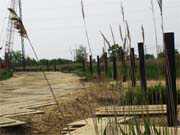Conflicting appraisals of a 16-acre track along the Hackensack River may soon put the Board of Education and the Town Council into conflict again.
The Town Council was supposed to review the latest appraisal this week to determine the actual assessed value of the land.
The right to sell as well as the actual value has been a source of dispute between the two public bodies for over a year. The town is proposing to sell the property to New Jersey Transit. The Board of Education claims ownership to the property.
Although appraisals done previously by both the board and the council showed a figure of about $2 million, last month, Peter Zipp, the town’s tax appeal attorney, sent the matter for a third appraisal after he claimed the land could be worth as much as $6 million.
“I thought we needed to have our own expert tell us what the land was worth,” said Board of Education member Tom Troyer last week.
The $6 million figure is based on the ability of a private firm to construct on the site. But a preliminary report based on the third appraisal shows the land too unstable to support such structures without expensive pilings.
“We just got the report which said the land might have been worth that much, but for the fact that we would have to drive piles very deep if we wanted to develop it,” Mayor Dennis Elwell said.
Who has the right to sell the property?
This most recent appraisal has only stirred up a pot of conflict between the town governmental bodies who had been disputing ownership on the tract for over a year.
Even as the bulldozers shove dirt into place to shore up the new tracks turning south to run along the shore of the Hackensack River, conflicting opinions still exist as to who owns the land under the tracks and whom should get the money if and when the land gets sold.
The town of Secaucus claims the council has the right to negotiate the sale of land to NJ Transit since the Board of Education deeded it over in the 1980s for use as sports fields.
Members of the Board of Education claim the land still rightfully belongs to it because the one-dollar sale to the town was done to enhance the town’s recreation program, not line the Town Council’s pockets.
The property runs along the Hackensack River just south of Harmon Cove Towers. It originally was given to the Board of Education by the developer of the Harmon Cove residential units in the early 1980s as compensation for the potential increase of students caused by the development. Hartz Mountain Industries deeded the land to the board in case the board needed to build an additional school.
The increase never happened, and according to town officials, the school district deeded the land over to the town partly to avoid the cost of upkeep on the property. The town built two baseball fields on the property to accommodate its growing recreation program.
The property, however, was seen as having little value because of the large wetlands component, a matter than came into dispute once NJ Transit offered to purchase it.
NJ Transit – which has an easement through the property to construct a rail line if necessary – is currently altering the direction of the Bergen railroad line. This project will eventually close the Harmon Cove train station and turn train traffic south along a spur through the disputed property. NJ Transit sought to purchase the land. Mayor Dennis Elwell, seeing an opportunity to get money to fund a possible recreation center, negotiated for about $1.8 million.
Troyer, leading the challenge to the sale, said the town should not benefit from the sale.
“We can use that money in our budget,” Troyer said.
The matter may have to be resolved in court, Troyer said, something Elwell said he would like to avoid.
“We have met several times with school officials to work this out,” Elwell said, fearing that an inter-governmental dispute might ruin the sale for everybody. Elwell noted that NJ Transit has right-of-way through the land whether ownership is transferred or not.
Councilman John Bueckner, who served on the Board of Education during the original negotiations with Hartz for the land, said he believed NJ Transit could have other plans such as the creation of a parking facility.
Most of NJ Transit’s work is geared around the opening the Allied Junction train hub, currently set for sometime in 2004. The original plans do not call for parking, and parts of the 16-acre land might serve that use.
“If that’s the case, then NJ Transit will want to buy it no matter what,” Troyer said. “Our job is to make sure that the money is used appropriately. Since the property was originally given to the schools, selling it should also benefit the schools.”
Elwell has routinely argued that a new recreation center would indirectly benefit the schools by providing space for many town recreation programs currently forced to use school facilities.
